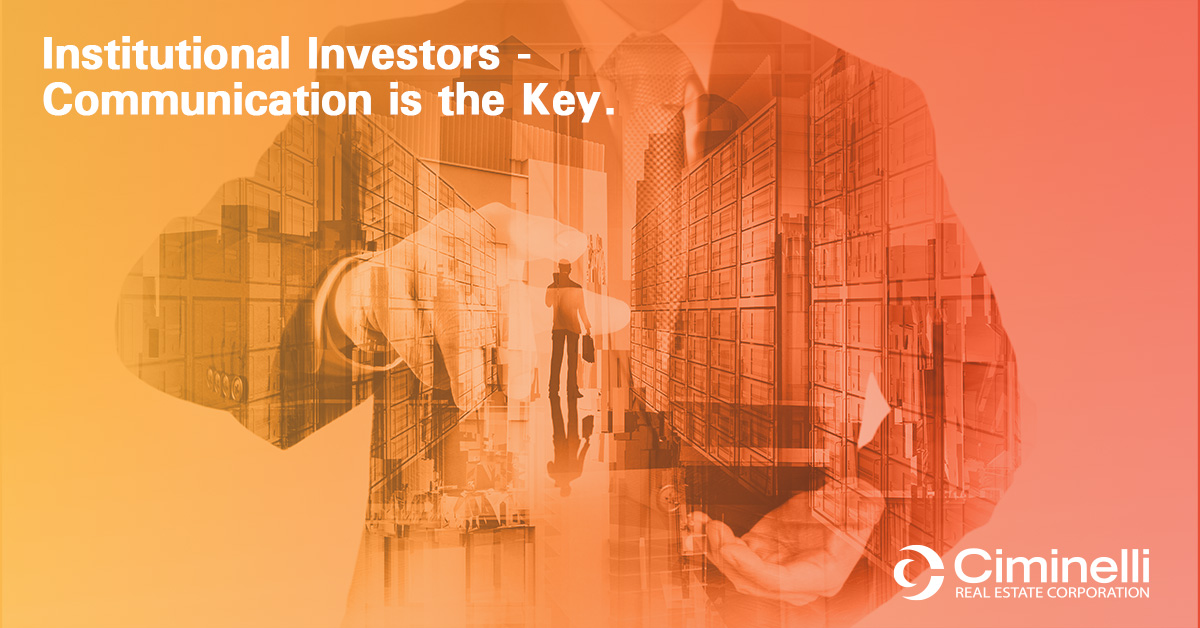
Institutional investors are among the most active and well-funded investors in the real estate market. These organizations or entities pool together large amounts of money and invest those funds on behalf of others. These investors manage significant amounts of capital, often from multiple sources, such as pension funds, insurance companies, endowments, foundations, mutual funds, hedge funds, and investment banks. Their investment decisions are typically guided by specific goals, risk tolerance, and regulatory requirements. Institutional investors play a crucial role in real estate markets as their substantial resources can influence market prices, advance the largest investments, and drive changes in corporate governance and business practices.
Ciminelli’s investment professionals approach communication with institutional investors with a strategic and professional approach. Our team recognizes these investors often manage significant capital and have specific requirements before an investment can even be considered. Taking care to manage the fine points of our communication with them can make the difference. Here’s a few tips that have helped develop important relationships for our team:
Research and Targeting: We thoroughly research the institutional investors we’re targeting. Understanding their investment preferences, risk tolerance, portfolio allocation, and any specific criteria they have for real estate investments is important. Doing the work to understand as much as you can about an investors preferences and portfolio will help you connect on a number of levels and illustrate a willingness to fully understand their needs as the relationship matures. Institutional investors are known for their disciplined investment approaches, thorough due diligence, and long-term investment outlook so building a relationship over time through thoughtful research and communication is key.
Clear Communication Channels: Establish clear channels of communication, including regular updates, conference calls, and in-person meetings to ensure institutional investors feel informed and engaged throughout the investment lifecycle. The timing of messaging is important, but so are the tools we use to communicate. The digital age has streamlined communication making online investor portals, file sharing systems, etc. the new tools of the trade. While these tools make your task easier don’t neglect the need for face-to-face communication as well.
Personalized Outreach: Through research we identify key decision makers to target our communication. Messaging should be directed at these individuals in an effort to create interest at a personal level. Craft personalized messages that address their unique needs and objectives. Communication is all about building relationships over time, and it’s through the sharing of knowledge, insights, and opportunities that strong relationships flourish. Our team participates in industry events and organizations as a way to raise our professional profile. Investor relations individuals or teams can be very successful given the time needed to make these connections.
Professional Presentation: As with anything, putting your best foot forward will always make an impression. Your materials are no exception. We take care to create communications that are polished and well-designed, including pitch decks, investment memorandums, and due diligence packages. Materials should be informative, visually appealing, and highlight the value proposition of the investment.
Quantitative Analysis: Information is a special kind of currency. We are always willing to share knowledge, research , and basic information on the market, prospects, trends, etc. to attract interest in our communications with institutional investors. Beyond that, opportunities should be thoroughly detailed including top notch financial analyses, projections, return on investment calculations, and risk assessments. Institutional investors require rigorous quantitative analysis to make informed decisions. If you’re sharing the correct information in an easily understood format it creates significant value. Institutional investors value partners who can provide valuable insights and strategic guidance.
Customized Reporting: The details of any investment are critical. Reporting on performance is often a unique language from one group to the next. Understand the reporting structure and format that best aligns with the systems and processes of institutional investors and save them time and energy. Schedule the reports and ensure they are standard to remove any guesswork.
Remember that institutional investors have specific requirements and a rigorous decision-making process. Building relationships with these investors takes time, persistence, and a commitment to professionalism and transparency.
